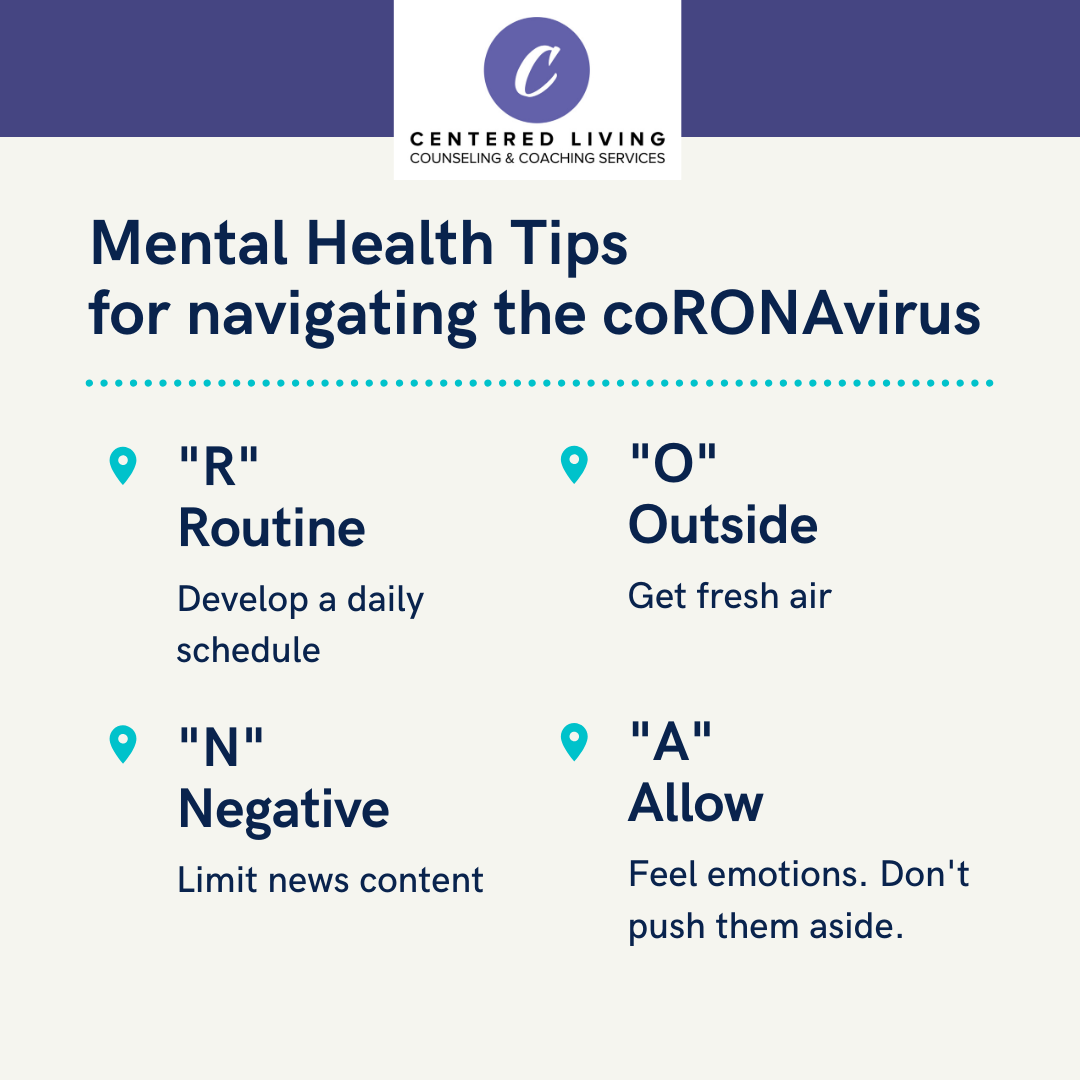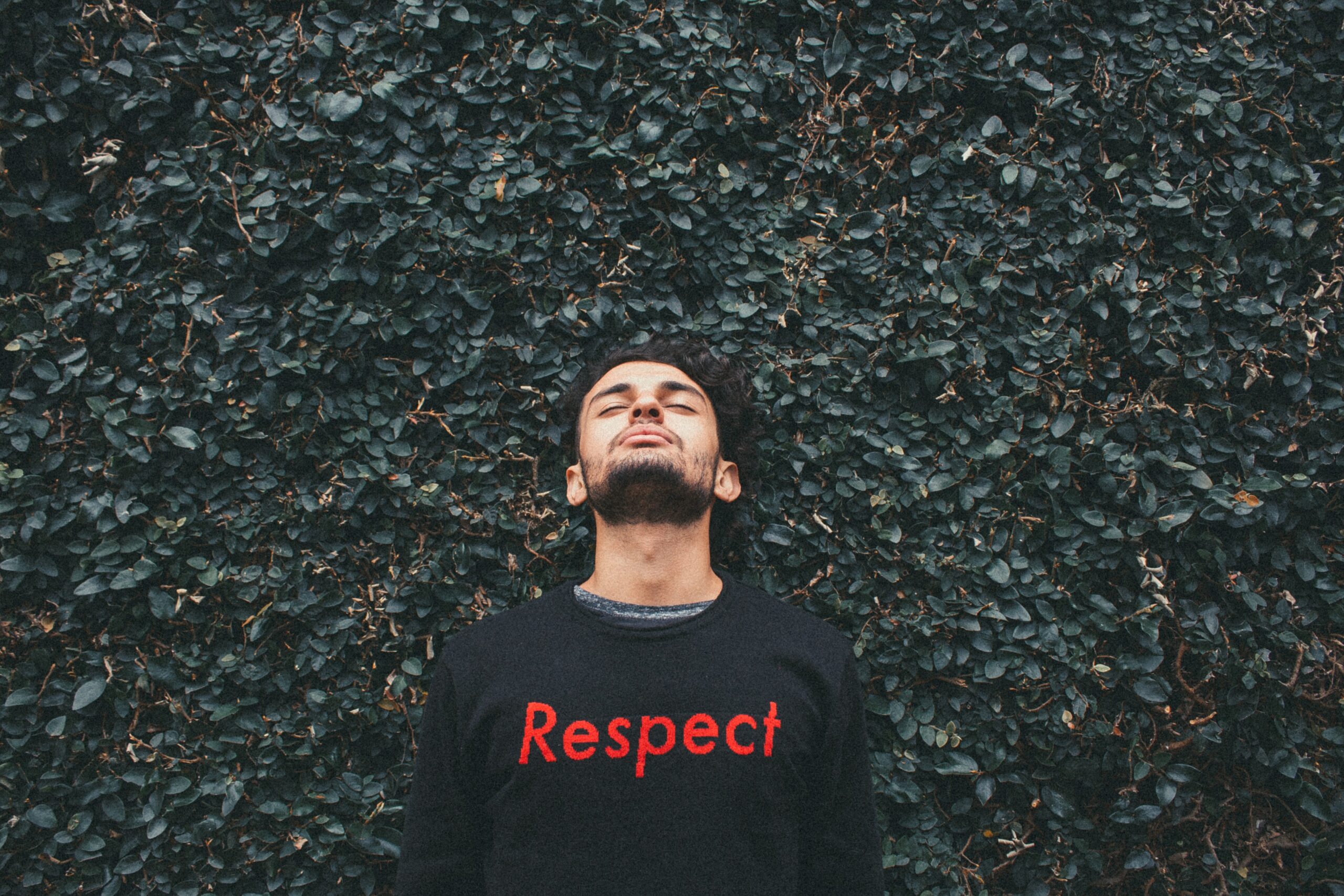Managing Emotions During a Global Pandemic

When we think about needing to take care of our health we don’t often remember to include our Mental
health. Thankfully, that is starting to change as we see an increase in the discussion of the importance of
mental wellness. We are living in a very unique time, as the global pandemic of Coronavirus (COVID-19)
is affecting everyone around the world. Our normal routines continue to be disrupted and many aspects of what was our “normal way of life” are no more. As a result, moments of struggle may become more
common.
As a Mental Health Counselor, one of the most common struggles I’ve heard from people since the onset
of the Coronavirus pandemic is an increase in Anxiety. Anxiety is characterized by an intense feeling of
worry or even a sense of panic. It can include feeling extreme tiredness (lethargic/fatigue), having difficulty sleeping, being irritable (easily frustrated), difficulty concentrating (your mind goes blank) and/or muscle aches and soreness.
When I think of Anxiety I often think of fear. Most people might think, “Well I’m not afraid of anything,
so I must not have anxiety.” But do you ever feel queasy or have a sense of uneasiness in the pit of your
belly? Do you sometimes have a racing heart or get hot and have sweaty palms when you think of certain
things? What are some of the things that cause you to feel this way? (Helpful Hint: Take out a pen and
piece of paper to jot those things down). Examples might include upcoming bills that you can’t pay,
wondering about childcare for your small children while you work from home, elderly family members
who may be exposed to the virus, etc.If you answered yes to any of those questions, then you might have experienced Anxiety at some point in your life.
Although this is not an exhaustive list or discussion on managing general feelings of stress and Anxiety,
here are some tips to help you decrease these feelings that may be a result of managing life impacted by
the CoRONAvirus (Affectionately labeled “RONA”).
R: Develop a ROUTINE.
Besides our Essential workers, many people have found themselves working from home. With your
regular routine disrupted you might notice that your sleep/wake patterns have been affected. Additionally, working from home might also include zoom meetings in your favorite pair of pajamas. I have found that this actually increases mood instability, alternating from moments of intense burst of sadness or worry seemingly out of the blue (symptoms characterized by depression or anxiety).
It might seem minor, but maintaining some sense of normalcy can really help to stabilize your moods.
Having set sleep and awake hours, getting dressed for the day, making up your bed, having set meal
times, set work hours and having a designated space in your home for work related materials can go a
long way in regulating your day and creating a sense new normal in what may feel like uncertain and
every changing times.
O: Get OUTSIDE for fresh air.
There are many reasons to get outside everyday for some fresh air, including to get your daily dose of
Vitamin-D (a natural mood elevator). Also, physical exercise is great for boosting and maintaining a
healthy immune system. Be sure to wear your mask!
N: Limit NEGATIVE news content.
There is so much going on in our world today, from the health crisis and global pandemic, racial tensions, political chatter and more! We must learn to balance our need to stay informed with our need to maintain mental peace of mind. Social Media has become a major news source for many, but it, in addition to television and radio news outlets, can tend to replay reels of negative news bombarding us with graphic and intense emotion invocating images. This will undoubtedly increase mood instability and may affect your sleep patterns as well. If you are experiencing an increase in emotions of anxiety or worry, you may benefit from monitoring and limiting your news intake. Balance is key.
N: Limit NEGATIVE news content.
There is so much going on in our world today, from the health crisis and global pandemic, racial tensions, political chatter and more! We must learn to balance our need to stay informed with our need to maintain mental peace of mind. Social Media has become a major news source for many, but it, in addition to television and radio news outlets, can tend to replay reels of negative news bombarding us with graphic and intense emotion invocating images. This will undoubtedly increase mood instability and may affect sleep patterns as well. If you are experiencing an increase in emotions of anxiety or worry, you may benefit from monitoring and limiting your news intake. Balance is key.
Emotions are ok. They are a normal and healthy part of life. When we ignore them or try to “stuff” and
“hide” them away, they tend to come out at the most inconvenient time. The thought of sitting with your
feelings might sound overwhelming. However, I encourage you to allow yourself to feel, even if just in
small doses. Set aside time where you can journal, cry, yell, read, pray or just sit and “be”. Start with 10
minutes and see if you can build from there. You may find that you start to look forward to these small
moments of reprieve where your emotions can be acknowledged, you experience mental clarity and a
lifted weight.
Life is a journey, best traveled stress free! Center your life and remember
to journey well…
_______________________________________________________
For more information on Kelli Center or services provided with Centered Living
Counseling & Coaching Services, LLC please visit our
website: http://www.CenteredLivingCounseling.com
 Kelli Center is a Licensed Professional Counselor and the owner of Centered Living Counseling & Coaching Services, LLC. With over 16 years of experience in the behavioral health field, she has worked to assess and address an array of needs, most commonly including: depression, anxiety, relationship communication and trauma. Kelli works with individuals, couples and families from all socioeconomic and cultural backgrounds. She is passionate about helping people to become mentally and spiritually whole so that they can be free to live the life God called them to live. She feels especially called to bridge the gap between the spiritual and mental health communities, bringing holistic awareness to mental and emotional needs. Kelli provides Christian counseling and also facilitates supervision and training for other counselors seeking their professional license.
Kelli Center is a Licensed Professional Counselor and the owner of Centered Living Counseling & Coaching Services, LLC. With over 16 years of experience in the behavioral health field, she has worked to assess and address an array of needs, most commonly including: depression, anxiety, relationship communication and trauma. Kelli works with individuals, couples and families from all socioeconomic and cultural backgrounds. She is passionate about helping people to become mentally and spiritually whole so that they can be free to live the life God called them to live. She feels especially called to bridge the gap between the spiritual and mental health communities, bringing holistic awareness to mental and emotional needs. Kelli provides Christian counseling and also facilitates supervision and training for other counselors seeking their professional license.
Recommended Posts

Respecting The Holy Spirit
03/25/2021

Responding to the Holy Spirit
03/23/2021

Recognizing the Work of the Holy Spirit
03/15/2021
